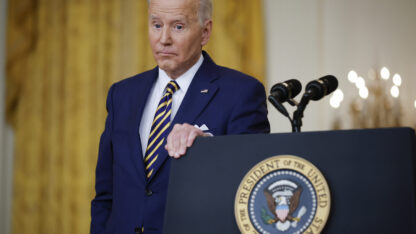In a city where tourism fuels a bustling nightlife, bartender Jacques Primo never imagined he’d find himself out of work.
But the seafood restaurant where Primo tended the bar on Savannah’s historic riverfront closed its doors and laid off its staff in late March, after coronavirus fears caused the city to cancel its profitable St. Patrick’s Day parade. Soon bars got shut down, restaurants were limited to takeout orders, and Americans began sheltering at home, as infections proliferated across the state.
On Thursday, Primo and a former co-worker waited in line for donations at a drive-thru food bank set up on the riverfront about a block from the restaurant where they had worked, idling among dozens of cars with open trunks. More than 130,000 restaurant and hotel workers across Georgia lost jobs in March, the state Department of Labor said. That’s hit especially hard in Savannah.
“It’s just shut down everything, turned off the whole city,” Primo said. “That’s the thing that hurts. Before I’ve never been worried, because I’ll go find another job… Now you can’t. It’s impossible.”
Drastic measures taken to fight the coronavirus are continuing to cause sky-high increases in employment. Georgia processed 318,000 new unemployment claims last week, according to the Department of Labor reported Thursday. While that’s down slightly from the record-smashing previous week, more than 900,000 Georgia workers have filed for unemployment benefits since March 22.
The Department of Labor said it has paid more than $509 million in state and federal unemployment benefits since mid-March, and people receiving state benefits are getting an additional $600 federal weekly supplement starting this week. The state says it’s still working on paying special benefits to self-employed, contract and nonprofit workers. Meanwhile, the department says it’s asking retirees to return to help handle the crush of applications.
“We are reaching unprecedented claim levels of almost one million Georgians filing for unemployment,” said Georgia Labor Commissioner Mark Butler. Georgia had a workforce of just more than 5 million people before the crisis began.
In Savannah, the hospitality industry employed about 23,000 workers. And visitors to Georgia’s oldest city spent an estimated $3 billion here in 2018.
There’s no telling when the visitors will come back. Gov. Brian Kemp has said he’s committed to reopening Georgia’s economy, but has given no timetable as deaths and infections continue to rise.
Confirmed coronavirus deaths in Georgia reached 617 on Thursday, when the state Department of Public Health also reported more than 16,300 confirmed infections statewide.
Feds To Let Farmers Petition To Extend Migrant Workers’ Visas
Georgia farmers who rely heavily on seasonal migrant workers may see some flexibility in Visa approvals because of the coronavirus pandemic.
Homeland Security officials and the U.S. Department of Agriculture announced a temporary rule Wednesday to change H-2A visa requirements.
Farmers can now petition to keep H-2A migrants already working in the U.S. beyond the current three-year limit, DHS said.
Travel restrictions and reduction in officials processing visas could reduce the number of farmworkers by as many as 60,000, according to the Economic Policy Institute.
H-2A farmworkers make up 10% of crop laborers nationwide.
DHS said the temporary final H-2A rule will take effect when it’s published in the Federal Register.
Georgia Small Businesses OK’d For $6 Billion In Relief Funds
Nearly 30,000 Georgia small businesses have been approved for $6.7 billion worth of federal coronavirus relief loans, according to the first batch of data released by the Small Business Administration this week.
The money comes from the Paycheck Protection Program created by the federal coronavirus relief bill.
The application window is open through the end of June, but about 70% of the program’s funds are already accounted for.
The National Federation for Independent Businesses is urging Congress to dedicate another $250 billion to the program because, it says, the money may be exhausted within the week.
The federation says according to its research, about half of small businesses say they can survive no more than two months under current conditions.









